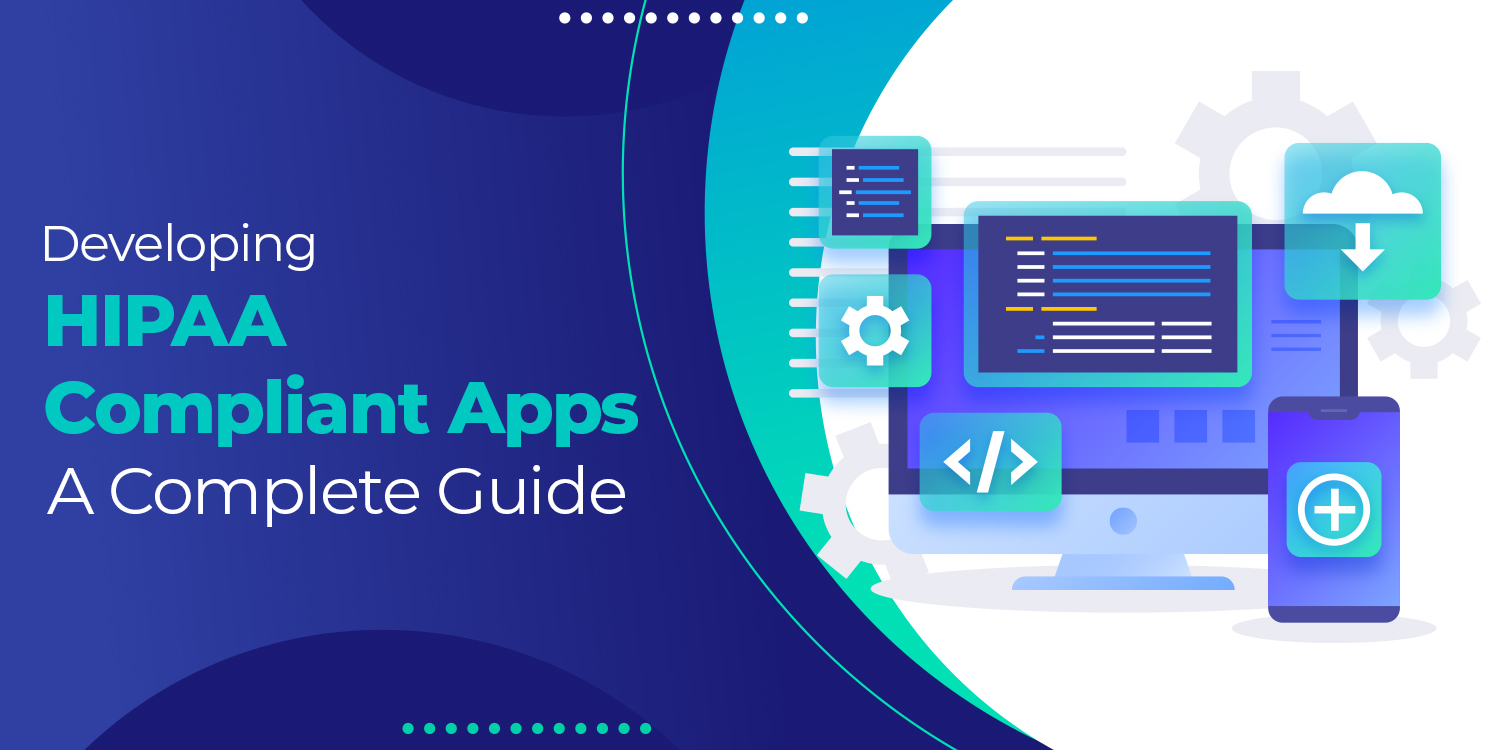Developing HIPAA Compliant Apps: A Complete Guide
In the healthcare industry, HIPAA compliant apps are a must. HIPAA is the most important piece of legislation for anyone looking to create healthcare-related applications or software for the U.S. market.
Healthcare mobile app development is revolutionizing at a faster pace. Therefore, almost every healthcare IT solution provider is giving importance to this scope. In this world of digitalization, healthcare service providers and their partners are investing in modern and advanced solutions to stay ahead of the competition. Different healthcare providers meet the standards of HIPAA-compliant healthcare applications for their solutions.
In the era in which we live now, it isn’t easy to keep data secure. If we look at any industry that deals with user data, we will undoubtedly see some correspondence that makes the industry more secure.
The healthcare sector, too, needs strict compliance to save users’ data from misuse in the current mobile age. Although compliance varies from country to country, HIPAA- Health Insurance Portability and Liability Act has become universal for many reasons.
In this article, we give you a basic overview of the process of creating HIPAA applications to help launch your digital transformation journey.
What is HIPAA Compliant Apps ?
Healthcare and insurance companies are widely using smartphones and wearable devices. These devices help the hospital to connect doctors with patients and virtually monitor their health. Smartphone apps that process, receive, or send private data in any manner must comply with HIPAA. Therefore, the HIPAA complaint apps are currently a popular type of development.
HIPAA ensures that there are no deviations in the handling and storage of patient data. It also covers information sharing, billing, and citizens’ health insurance.
The Health Insurance Portability and Liability Act (HIPAA) was introduced in 1996 to regulate user/patient data protection, reduce healthcare costs and protect health insurance for those who lose their jobs or change jobs. The healthcare service providers must follow HIPAA-compliant rules and regulations when working on application development.
One of the main goals of HIPAA is to provide insurance coverage and maintenance. It also covers areas such as administrative simplification. HIPAA also covers provisions related to the taxation of medical expenses.
Therefore, if you need to develop a Healthcare mobile app, your product must be HIPAA compliant. HIPAA-compliant apps ensure the privacy and security of patient information and control health insurance restrictions.
Types of Healthcare Data Domains
When developing a healthcare application for the U.S. market, you first need to find out what information you store and transmit through your application. There are two types of information:
PHI (Protected Health Information)
It includes doctors’ bills, emails, MRI scans, blood test results, and other medical information.
CHI (Consumer Health Information)
It contains information that you receive from your fitness monitors, such as the number of calories burned, heart rate readings, and the number of steps you walk.
So, if your app or software processes, stores, or transmits any PHI data, then it must undoubtedly be HIPAA compliant.
Even if you want to create an app or software for other countries or regions, you will still have to meet the country’s requirements. Almost every country has its legislation governing the use of private medical data.
How Does HIPAA Compliant Apps Work?
In terms of compliance, HIPAA has two main aspects that are mentioned below.
HIPAA Privacy Rule: It codifies the types of data that make up Protected Health Information (PHI).
HIPAA Security Rule: It describes the responsibilities of each organization that manages electronically protected health information (ePHI).
All healthcare organizations that process ePHI are covered entities, which means they must follow HIPAA rules.
Why is HIPAA Compliant Apps important?
The HIPAA Regulation is a comprehensive law established to assist both healthcare organizations and patients. Therefore, when creating HIPAA-compliant apps, it is necessary to know why it is important.
For patients
HIPAA is very important as it forces health plans, service for providers, business associations of the entities covered, and clearinghouses to implement specific safeguards to protect sensitive health and personal data.
While no medical organization wants health information stolen or sensitive information disclosed, there would be no way to force the healthcare industry to protect data without HIPAA. In particular, HIPAA protects patients and their data. Criminals may use personal data and private medical information against patients.
HIPAA protects patients from identity theft, a widespread crime related to personal data fraud. Identity theft can lead to large debts, significant financial losses, and harmful counterfeit claims for a person. No one can pass on for patient information without their consent, so HIPAA helps ensure that all information disclosed to health plans and providers or information created, stored, or transmitted, is subject to strict security measures.
Entities should inform patients of the breach as patients are fully entitled to their medical data. This enables smooth data exchange between several healthcare institutions. Even with the utmost compliance and care, medical organizations can make mistakes when storing or using health information. If patients can obtain copies, they should check for errors and make sure they correct them.
Before the invention of the HIPAA Privacy Policy, organizations were not required to share and publish copies of PHI with patients.
For Organizations
HIPAA will help streamline healthcare management functions by ensuring the secure transmission of PHI and improving industry efficiency.
If a company does not comply with HIPAA requirements, they have to face massive fines that can sometimes reach a few million dollars. Each data breach will result in a fine of $100- $50,000 if the data breach occurs because the hospital does not comply with HIPAA; each person’s disclosed data is a separate case. Fines per unit may not exceed $1,500,000 per year per category.
Standards for electronic transactions and record keeping ensure that everyone is on the same page. Because all HIPAA-covered entities must use the same nationally recognized identifiers and code sets, this ensures the secure transmission of EHI between health plans, providers, and other entities.
Key Features of HIPAA Compliant Apps
When you decide HIPAA Compliant app development, you must know that the features may differ significantly for patients, providers, and clinics. Let us see the features of HIPAA Compliant apps for patients, doctors, and hospitals.
| Patient | Doctor/ Provider | Hospital/ Clinic |
| Registration | Registration | Registration |
| Search Doctor | Schedule Management | White-label Solution |
| Appointment Booking | Manage Appointments | On-board Doctors and Staffs |
| Appointment Confirmation | Consultation with Patients | Patient’s Information Management |
| Consultation with Doctor | Provide ePrescription | Consultation with Patients |
| ePrescription | Integration of Pharmacies and Labs | Setup Pharmacies and Labs |
| Share Feedback | Payment and Refund Management | Brand Awareness |
How to Build HIPAA Compliant Apps
Find an Expert
Do not try to meet all HIPAA requirements if you do not have enough experience. So, it is better to take an advice from an expert who has years of experience. You can choose the best healthcare app development company or outsource the entire HIPAA-compliant application development process to an experienced team. But it is highly recommended to choose experts from the telemedicine software company as it is beneficial for start-ups and large healthcare companies.
Step 2: Evaluate Patient Data
Ensure you need all the data you collect from patients and determine what data can be classified as PHI. Check which PHI data can be avoided from saving or transmitting through your mobile app from the collected data.
Step 3: Find Already HIPAA-Compliant Third-party Solutions
Getting custom HIPAA mobile apps from scratch can be costly. So it is better to go with white-label solutions. Such third-party solutions save time, money, and effort, and this is called IaaS (Infrastructure as a Service).
To use a third-party service to store or manage PHI data, you must sign a business associate agreement with the third-party companies to ensure trustworthiness. If you use high-quality third-party solutions, you have to worry about creating something that isn’t present in the solution.
To help you out with this step, we bring VCDoctor, a white-label telemedicine solution that can be customized according to your business. To know more in detail, request a free demo today!
Step 4: Encrypt Complete Stored and Transferred Data
Use best security practices to encrypt your patients’ sensitive data so that there are no security breaches. Make sure that the stored data is encrypted to protect it from theft.
Step 5: Maintain and Test the App for Security
Testing is an integral part and should be done after each update. Test your mhealth apps both statically and dynamically.
Maintenance is an ongoing process that you must perform to ensure the security of your application. Libraries, tools, and frameworks for building and securing an application are constantly being updated. After HIPAA-compliant app development, you must update the app regularly to avoid security breach.
How Much Does it Cost to Build HIPAA Compliant Apps?
Compliance with HIPAA requirements with healthcare applications is mandatory for any healthcare provider using a mobile application. Several elements in HIPAA need to be considered when developing mHealth apps. These elements include security, access control, and confidentiality.
The development cost to build HIPAA compliant apps depends upon many factors that are mentioned below:
- Type of application
- Type of platform
- Technology Stack
- Front-end development
- Features
- UI/UX etc.
These were some of the key aspects that vary the cost of HIPAA-compliant app development. Contact us for more information on the cost of developing HIPAA-compliant apps.
Conclusion
Healthcare is fast becoming the digital industry of the future. Healthcare organizations and providers must seek the best advice and service to develop healthcare applications from experts with comprehensive compliance strategies.
Developing a HIPAA-compliant application can potentially save you time, effort, and money, while HIPAA-compliant applications can help improve the security and protection of patients’ medical records.
To save money and time, be sure to use ready-made solutions as much as possible. VCDoctor offers the best technological solutions to create healthcare platforms that increase security, privacy, and reliability. With extensive experience in developing application and software development compliance, you can expect the best platform for your operations.
VCDoctor helps you with security issues and HIPAA compliance, so if you need a consultation or mobile development services, contact our experts and book a free consultation call.




